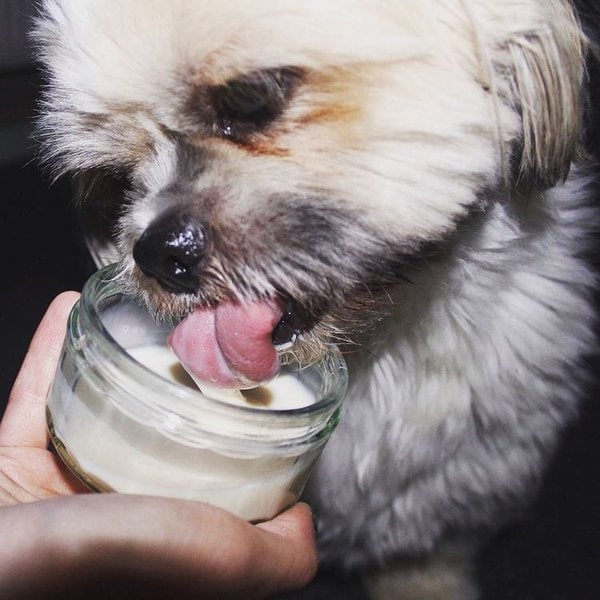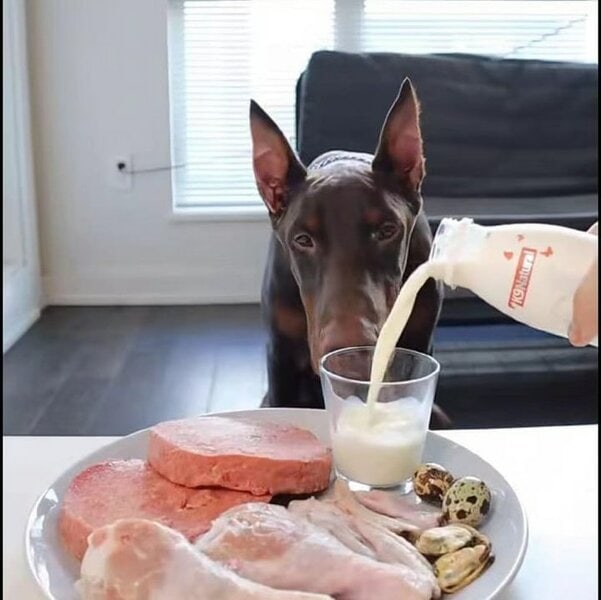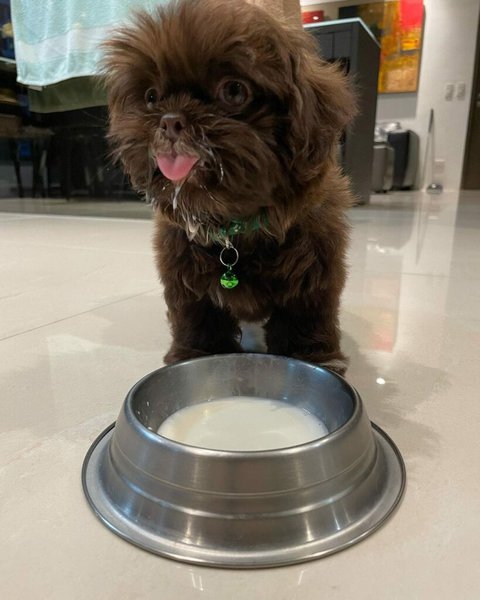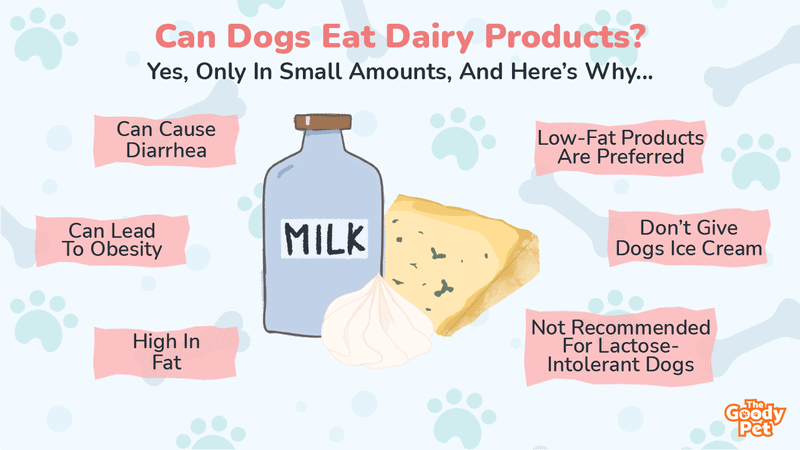Dairy or milk products are a staple in the human diet. Almost all cultures in the world produce some kind of dairy product that came from mammals, such as cattle, goats, or sheep.
But is it safe for our furry pet’s consumption? Is it safe to give them milk or offer cheese as a treat?
Yes, dogs can eat dairy products but with a caveat. It can only be given in small quantities and should not be a major component in their daily diet. Dogs have different digestive systems, and most of them cannot tolerate lactose, which is the main carbohydrate found in milk products.
Their small intestines cannot produce the enzyme lactase that breaks down or digests the lactose sugar.
In this article, we will discuss the different dairy products commonly found in supermarkets that we humans habitually consume and might occasionally share with our dogs and their effect on their health regarding its consumption.
Is It Safe For Dogs To Eat Dairy Products?

It depends. The first thing to ask yourself whether to give a dairy product or not to your dog is to know if your dog is lactose intolerant.
Each dog has a different tolerance level to milk and its products, with some only showing mild symptoms. The signs to look out for are:
If your dog showed any of the symptoms above with just a small amount of dairy product taken, then it is safe to assume your fur baby is lactose intolerant.
However, some dogs may experience more severe reactions to milk, like skin rashes, excessive itchiness, balding spots, and skin infection. If this is the case, then they are likely allergic to dairy, and any milk products should be eliminated from their diet.
Can Dogs Drink Milk?

Yes, dogs can drink milk, but only in small quantities.
Aside from causing possible gas and diarrhea, milk is also high in fat and other natural sugars. Excessive fat can cause pancreatitis and obesity later in life, which has other complications.
Fresh milk and evaporated milk contain the most lactose among all dairy products, even though goat’s milk contains a considerably lower lactose amount.
Goat’s milk has smaller fat molecules than cow’s milk and has a less dense curd formation, making it easier to digest and tolerate.
Some commercial milk products are available that are lactose-free, but these still contain some fats that may wreak havoc on your dog’s diet. It is much better if you give your dog just plain water instead.
As an occasional treat, milk can supplement your dog’s calcium and protein needs for strong bones and muscle growth. Milk also contains vitamins A and B12 for good eyesight and brain and nerve development.
When giving milk to your dogs, a tablespoon or two is added to their water.
But, as a rule, it is still recommended that your dog gets the nutrients from its regular meals that meet its daily nutritional needs.
Are Dairy Products Toxic To Dogs?
It depends on the amount you’d allow your dog to eat.
Other milk products can also be safe for your dogs, provided you know their level of tolerance. The degree of lactose content varies from product to product, and these can be given as treats.
Cheese
Cheese has a lower lactose level than milk, so it is safe to say that more dogs can tolerate it.
It also contains calcium, proteins, essential fatty acids, and vitamins A and B. However, this does not mean you can freely give them to your dogs. Moderation is always key when it comes to foods that are not part of their daily diet.
It also contains a fair amount of salt and fats, depending on the type of cheese. Excessive amounts could lead to obesity and cause pancreatitis, which is especially painful for your dogs.
Some cheeses also contain other ingredients that may be harmful to Fido, like garlic, onions, or chives.
Is Blue Cheese Safe For Dogs?
If you have a liking for blue cheese and are not sure if it’s alright for your fur baby, sorry to disappoint you, but we do not recommend that you share blue cheese with your dog.
Blue cheese like Stilton and Roquefort contain mold cultures that can be highly toxic to dogs. Roquefortine C, a substance that is present in blue cheese, can cause adverse reactions.
Small amounts of blue cheese may cause vomiting, diarrhea, and increased body temperature. Large chunks may cause seizures.
Are Low-Fat Cheeses Safe For Dogs?
Yes, low-fat cheeses are the better choice, but they should also be given in moderation.
For a low-fat and low-salt treat, cheeses that can be recommended are mozzarella, cottage cheese, or goat cheese.
Other cheeses, like parmesan, feta, or cheddar, are also a safe bet, but due to their salt content, it is best given in small doses.
One issue most fur parents ask is if they can give their dogs medicine with cheese. Yes, in fact, dog owners would sometimes use cheese to hide pills when having difficulty administering medications to their pets.
Plus, dog trainers usually use cheese during training sessions to motivate dogs. String cheese is always preferred because of its low lactose and salt. But care should be taken when given to dogs since the stringiness could make it hard for some dogs to swallow.
Ice Cream

Ice creams are generally not a good treat for your dog. It is high in fat and sugar and does not offer anything good but an upset stomach.
Ice creams with artificial sugars, like xylitol, are even worse. The consumption of xylitol is known to be fatal and can cause liver failure and seizures in dogs.
Aside from that, our favorite chocolate or coffee ice creams are a big no-no since these ingredients are considered toxic to our furry pets. You accidentally add in some nuts, like macadamia, and your dog is in for some serious health emergency.
The safest ice cream you can give your dog is plain vanilla, or better yet, a sorbet, which does not contain any milk.
Just make sure that it does not have lots of sugar, and the fruit ingredient is safe to eat, like blueberries, mangoes, or cranberries.
Grapes, cherries, and avocados are toxic to dogs.
Yogurt
Yogurt is safe for dogs, provided they are plain or non-fat plain. It is a good source of calcium, protein, vitamins, and probiotics that can improve your dog’s gut health.
But, remember that it is still a dairy product that can cause lactose intolerance. When giving yogurt, it is recommended to follow the 10% rule: do not give a treat that is more than 10% of their daily caloric intake.
Also, a lot of yogurts in the market may contain some artificial sweeteners, so it is best to check the labels.
Whipped Cream
A popular addition to desserts, whipped cream’s airy and light texture makes it an ideal sweet treat for us humans.
But, for our dogs, not so much. Its high fat and sugar content and lack of any nutritional benefits like vitamins and minerals make whipping cream not an ideal choice as a treat.
Plus, its airy volume makes it easy to forget that we are giving them enough already. The amount given to dogs should not exceed the size of their paws.
Sour Cream
A tangy and sour dairy product that has been fermented with lactic acid bacteria, sour cream has been used to add flavor to our favorite dishes like soups, tacos, and sauces. But, again, sour cream is not a recommended dog treat for our dogs.
It has high-fat content, and some commercial products contain gelatin, the rennin enzyme, and modified starches that are not suitable for dogs.
A small amount would probably have no issues for your dear Fido, but lookout for any signs of stomach upsets.
Butter
Lastly, Julia Child’s famous quip that “anything is good with enough butter” would not sit well with our dog’s health.
Butter contains saturated fats, and adding it to our pooch’s diet would certainly tax their heart and cause obesity.
What Do I Do If My Dog Ate Dairy Products?
If your dog is suffering from lactose intolerance, possible treatments include feeding your dog a bland diet to settle its stomach. Your veterinarian might also prescribe some medications that will stop vomiting and diarrhea.
Pancreatitis may occur if your dog has consumed large amounts of fat like dairy products. A blood test can be necessary to measure the pancreatic enzymes, and an intravenous therapy plus antiemetic medication should be administered to prevent dehydration.
It is better to consult with your veterinarian regarding dairy products as a final thought. Its high-fat content and your dog’s ability to handle lactose make dairy a less ideal treat to give.






